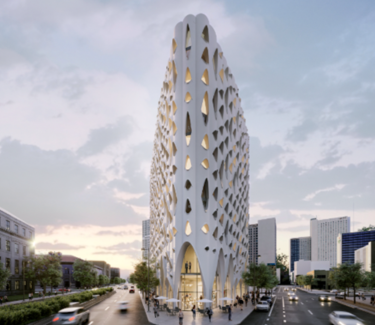Urban Villages To Open Populus, the Country’s First Carbon Positive Hotel, in Denver This Summer
Submitted February 2024, Published March 2024
 DENVER – Urban Villages, a leading real estate developer and environmental steward, is pleased to announce that Populus, the first carbon positive hotel in the United States, will open in Denver in Summer 2024. Managed by Aparium Hotel Group and constructed by The Beck Group, the 265-room hotel will feature a distinctive Aspen tree-inspired design by architecture and urban design practice Studio Gang, a ground floor restaurant, flexible event spaces, a coffee bar, and a signature rooftop bar and restaurant offering unobstructed views of the mountains, city skyline, and Civic Center Park. Upon opening, it will serve both as an architectural landmark for the Mountain West as well as a new milestone for the future of sustainable travel.
DENVER – Urban Villages, a leading real estate developer and environmental steward, is pleased to announce that Populus, the first carbon positive hotel in the United States, will open in Denver in Summer 2024. Managed by Aparium Hotel Group and constructed by The Beck Group, the 265-room hotel will feature a distinctive Aspen tree-inspired design by architecture and urban design practice Studio Gang, a ground floor restaurant, flexible event spaces, a coffee bar, and a signature rooftop bar and restaurant offering unobstructed views of the mountains, city skyline, and Civic Center Park. Upon opening, it will serve both as an architectural landmark for the Mountain West as well as a new milestone for the future of sustainable travel.
As the country’s first carbon positive hotel, Populus’ embodied and operational carbon footprint is being offset through forest and agricultural collaborations that sequester more carbon than the building emits throughout its lifecycle. Already, over 70,000 trees were planted in Gunnison County, Colorado in partnership with One Tree Planted vis-a-vis the United States Forest Service. Beyond offsetting the building’s footprint, this approach will also support and fortify biodiversity within the alpine ecosystem as it will re-introduce Engelmann Spruce, a primary tree species that was diminished by beetle kill.
“We hope Populus will serve as a model for how the real estate industry can more directly address the urgency of climate change while also meeting the preferences of today’s eco-conscious traveler,” said Jon Buerge, President and Partner at Urban Villages. “Buildings currently account for 45 percent of greenhouse emissions in the United States; we need a new way to build. We hope the transparency with which we are sharing our ever-evolving efforts to reduce the building’s carbon footprint during construction and operations and to establishing creative, local ways to sequester additional carbon off-site, will empower other developers to take a more sustainable and holistic approach.”













































































